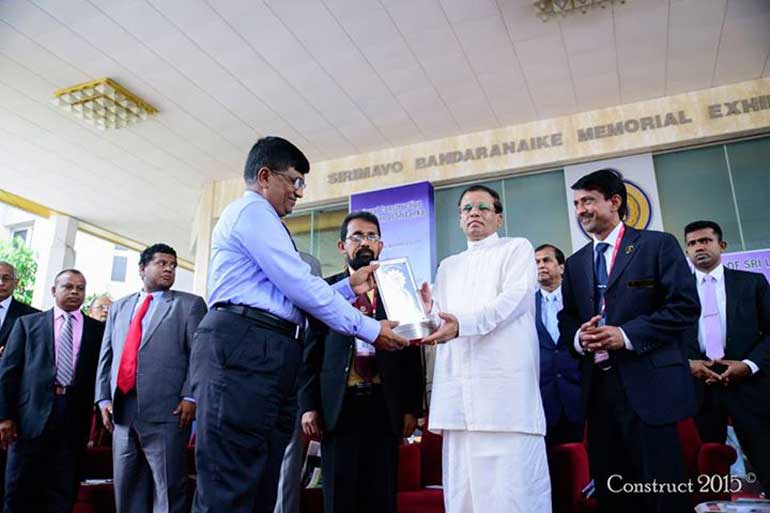Tuesday Feb 17, 2026
Tuesday Feb 17, 2026
Friday, 18 September 2015 00:00 - - {{hitsCtrl.values.hits}}
 Nivasie Developers Malabe Ltd. Managing Director Herman Gonsal receiving an award from President Maithripala Sirisena during the inauguration ceremony of the Construct 2015 exhibition at the BMICH. The award was presented in recognition of the contribution by Nivasie Developers which has proven its credentials over 15 years in Sri Lanka's real estate industry. Nivasie Developer has successfully completed and handed over more than 2,000 houses with modern amenities. Their latest addition, Orchid project comprises 200 houses and 94 apartments spread over a 22 acre land in Malabe
Nivasie Developers Malabe Ltd. Managing Director Herman Gonsal receiving an award from President Maithripala Sirisena during the inauguration ceremony of the Construct 2015 exhibition at the BMICH. The award was presented in recognition of the contribution by Nivasie Developers which has proven its credentials over 15 years in Sri Lanka's real estate industry. Nivasie Developer has successfully completed and handed over more than 2,000 houses with modern amenities. Their latest addition, Orchid project comprises 200 houses and 94 apartments spread over a 22 acre land in Malabe
The global smart cities market will increase significantly over the next five years anywhere from over $400 billion to more than $1.5 trillion by 2020, a report said.
In 2015 and beyond, the number and value of smart city initiatives will expand substantially, according to new report entitled “Smart cities, not just the sum of its parts” by Monitor Deloitte, the strategy consulting practice of Deloitte, a leading professional services firms, providing audit, tax, consulting, and financial advisory services.
The majority of new smart city projects globally will continue to be led by European cities and much of the expansion will occur in North American and advanced East Asian cities, followed by cities in the GCC countries. An example of a smart city is Smart Dubai which was launched in March 2014 with the mission of making Dubai the smartest city in the world by 2017.
“One of the most salient challenges for the development of smart cities is not the creation of new technologies, but changing the way that governments and organisations operate through technological innovation to make better, more efficient cities,” said Michael Romkey, director at Monitor Deloitte in the Middle East.
“The real benefit of smart cities is not the individual solutions, but the government-led creation of a holistic system where all solutions work together. Thus, smart cities need to make sure they build the right ‘soft’ infrastructure to underpin their smart solutions.”
In the Middle East, stakeholders are paying significant attention to the growing smart city industry and it is expected that new city sub-developments will incorporate elements of “smart” infrastructure.
There have also been numerous smart city conferences in the last year, sponsored by both the public and private sectors. The region’s smart city growth will largely be driven by developments in the government planning, administration, and operations area, backed by significant GCC government investments in e-government and mobile services.
“Developers in the GCC are becoming increasingly interested in adopting the information and communication technology (ICT) infrastructure and master-planning that will aid the development of modern smart cities,” said Romkey.
“This presents key opportunities in both the private and public sector to leverage this trend and increase investment in new smart technology,” explains Romkey. “However, a greater emphasis must be placed on how to leverage these developments to ignite a shift to better, smarter cities.”